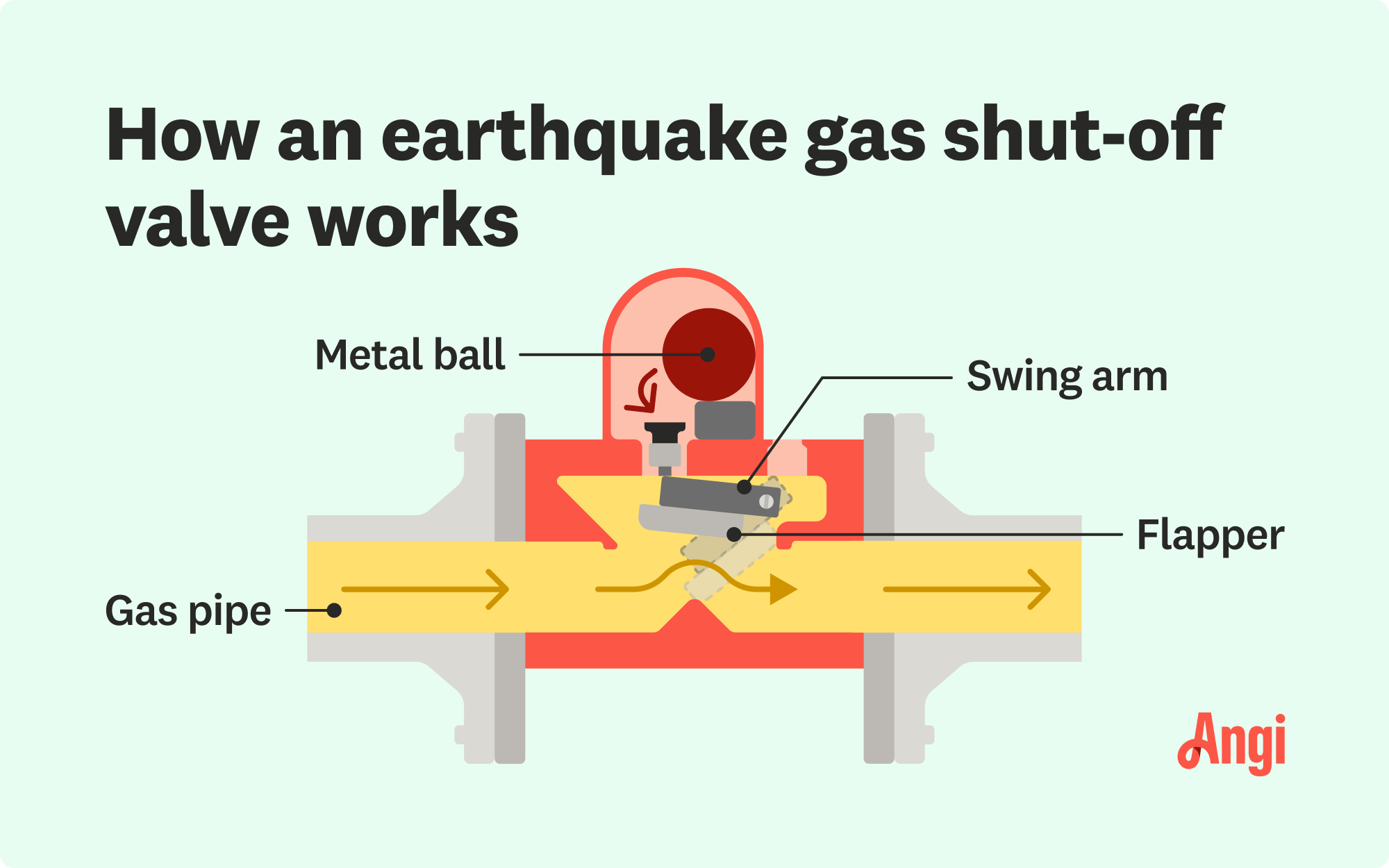
Discover how much it costs to repair earthquake damage. Learn about average costs, key factors, and ways to save on earthquake repairs for your home.
Earthquake valve installation costs $450 on average, and most people pay between $350 and $1,000. Since this project involves working on gas lines, you’ll need to call a pro.


Earthquake valves can prevent fires, gas leaks, and explosions during an earthquake.
An earthquake valve is a building code requirement in areas with high seismic activity.
This job will cost more if your gas lines are inaccessible.
You should install an earthquake valve for each active gas meter on your property.
It’s dangerous to DIY work on natural gas lines, so budget to hire a pro.
If you’re in an earthquake-prone area, a seismic shut-off valve is an important safety measure. Most standard earthquake valve installations cost $450, including parts and labor. Depending on the complexity of the installation, you could spend as little as $300 or as much as $1,200.
Earthquake shut-off valves help prevent fires and explosions from your gas line during a seismic event. In some places, they’re required to meet building codes. Here is a breakdown of what you might pay to have an earthquake shut-off valve installed.
Your earthquake valve cost will include the price of the valve itself plus the labor to install it. Some cities require an inspection as well, which could add extra costs.
The professional labor required to install an earthquake valve ranges from $150 to $400. Complex installations, such as having a difficult-to-access gas meter, could drive up this cost. Large installations requiring multiple technicians cost up to $1,500 in labor fees.
Most earthquake valves go for about $150 to $500, depending on the pipe’s size and pressure capacity. High-end models with a large pressure capacity can exceed $800.
The city may require an inspection in some areas, which can cost anywhere between $40 and $150. Some cities will include this cost in their fees, while others require the homeowner to cover it. In any case, getting your valve and gas lines inspected is always a wise gas line service cost to invest in.
An extra gas meter will double the cost of the job. Most homes only have a single meter, but you may have a separate gas meter for a pool heater or ADU. You’ll need to install an earthquake shut-off valve for each active gas meter on your property, specifically on the line that runs to the house.
If your gas meter and gas lines are not easily accessible, installing an earthquake shut-off valve will cost more. The higher price accounts for the added labor.
Some seismic gas shut-off valve installations require additional gas lines, which will increase the total cost. On average, gas line installation costs $300 to $900.
If multiple households use a single gas meter, as is common in apartment complexes or multifamily homes, you should install an earthquake shut-off valve on each gas line running to each household from the meter. Commercial installations like this cost $750 to $3,000, depending on the number of valves required.
In many cities, a plumbing permit is required for earthquake valve installation to ensure it’s done safely and correctly. While your contractor will handle the logistics of obtaining the permit, the cost will be included in your final bill. Permit and associated inspection fees typically range from $50 to $150, though this can vary depending on your city's regulations.
It may come as a surprise, but plumbers are oftentimes the best professionals to hire for gas-related jobs. In fact, most states require plumbers to maintain certifications and insurance in order to take on projects related to gas, including installing and repairing gas lines for appliances, like ovens, stoves, and dryers.
In some areas, earthquake shut-off valves are required by the building code. It may also be necessary for your homeowners insurance. Either way, if you live in an area that experiences earthquakes, you may want to install a valve for safety. During an earthquake, your valve will help:
Prevent gas leaks
Reduce the risk of fires and explosions
Prevent excess damage
Protect your safety
Without an earthquake valve, you’ll have to manually shut off your gas to safeguard against damage in an emergency. The diagram below shows how the valve works to stop the flow of gas and keep your home safe.

The labor cost to install a seismic shut-off valve is roughly $150 to $400, but it can go much higher for complex installs. But don’t try to cut these costs by DIYing this project; this is one project that should absolutely be left to a certified and trained natural gas plumber near you.
You should never attempt to DIY install earthquake valves in your home. Here’s why you need to hire a pro:
There’s a high risk of serious hazards, including gas leaks, fires, or explosions, if you make a simple mistake.
This job requires highly specialized knowledge of gas-pressure systems, pressure regulation, and the correct sealing techniques.
A contractor can ensure proper compliance with strict building codes in earthquake-prone areas.
The professional will also obtain the proper permits for this work.
Natural gas plumbers have the proper equipment and tools, such as pressure gauges and leak detectors.
Discuss where the shut-off valve(s) will be placed relative to your gas meter and main gas line. You can clear access for the plumber ahead of time.
Ask the contractor what permits are required and what specific building codes apply.
Talk about which type of valve (such as motion-sensing or excess-flow) makes sense for your needs and budget.
Ask how to check the valve periodically to ensure it’s working and what to do after an earthquake or gas shut-off event.
Home is the most important place on earth, which is why Angi has helped more than 150 million homeowners transform their houses into homes they adore. To help homeowners with their next project, Angi provides readers with the most accurate cost data and upholds strict editorial standards. We extensively research project costs to develop the pricing data you see, so you can make the best decisions for you and your home. We rely on reputable sources, including the U.S. Bureau of Labor Statistics, academic journals, market studies, and interviews with industry experts—all to ensure our prices reflect real-world projects.
Want to help us improve our cost data? Send us a recent project quote to [email protected]. Quotes and personal information will not be shared publicly.
From average costs to expert advice, get all the answers you need to get your job done.

Discover how much it costs to repair earthquake damage. Learn about average costs, key factors, and ways to save on earthquake repairs for your home.

Earthquake retrofit costs vary based on home size, location, and project scope. Learn what impacts your price and how to budget for a safer, more secure home.

In a seismic event, an earthquake gas shut-off valve could stop gas leaks and save your life. Learn more about its costs, installation, and benefits.

If you live in an older home in an area prone to seismic activity, you likely need to hire a seismic retrofitting company to protect your home from earthquakes.

Earthquake gas shut-off valve installation is important for any home in earthquake-prone areas. Explore how they’re installed here.

If you live near a fault line, your home may need an earthquake retrofit. Find out what you need to know about the process, from costs to who you should hire.